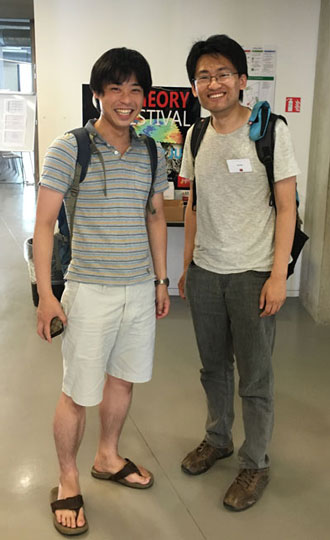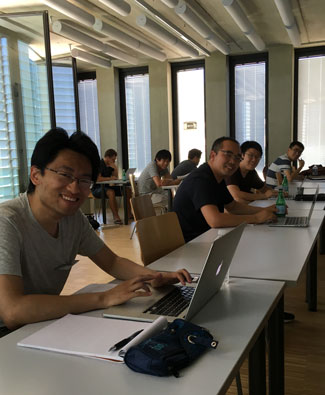Education & Opportunities
Graduate Studies

Program
Finding the right graduate program is a difficult and lengthy process, but it’s important that you find the right fit.
UC San Diego is recognized as one of the best places to study plasma physics in the United States. The Fusion and Astrophysical Plasma Physics Group (FAPPG) is a fusion and astrophysical plasma physics-focused research group located at the Center for Astrophysics and Space Sciences, UC San Diego. Graduate study through FAPPG is challenging, yet rewarding for those who bring curiosity, motivation, energy, and show persistence. Over the past 30 years, the program has been highly successful. Many graduates now hold positions as professors, researchers, and in finance and industry.
Graduate study through FAPPG provides outstanding opportunities to learn “model thinking”—how to develop models, analyze models, and extract useful ideas from models. Compared to similar PhD programs, there is more emphasis on defining problems, developing models, and multidisciplinary collaboration on experiments. There is less emphasis on large-scale simulations using existing codes.
Prof. Pat Diamond serves as the primary advisor for FAPPG graduate students. Other faculty and researchers also provide research guidance and career mentorship. Prof. Diamond’s students conduct research on a variety of topics, including turbulence flows, toroidal rotation and momentum transport, multi-scale interaction modeling, and other nonlinear plasma physics topics.
Graduate students spend a lot of time in scientific discussions, performing calculations, and writing. All students publish papers in prestigious scientific journals. They participate in seminar courses, run simulations for projects, and present their research at scientific conferences.
Prospective students are considered individually, but some relevant experience that is helpful in pursing graduate studies with FAPPG includes:
- Strong preparation in basic physics and related mathematics
- Prior research experience
- Familiarity with basic numerical analysis
- Scientific writing experience
If you’re interested in applying, contact Prof. Diamond at pdiamond@ucsd.edu. Please include a CV and a description of your research interests.
What is it like to be a graduate student of Prof. Diamond's?
Here are some ways you can learn more:
- Read descriptions of projects that Prof. Diamond's students are currently working on
- Read articles that Prof. Diamond and his students have recently published
- Email a graduate student—introduce yourself and ask questions
- Arrange a Zoom call with a graduate student and/or Prof. Diamond
Other ways to learn and gain experience:
- Read scientific papers; expand your knowledge of relevant journals
- Subscribe to news alerts on topics you're interested in
- Attend a fusion and plasma physics conference. Regional, national, and international conferences are held every year, depending on the size and scope of the conference. Seek out discounted registration rates for students and conference volunteers.
Courses Taught by Prof. Diamond at UC San Diego

Undergraduate Courses
ASTR 102—Electrodynamics and Optics for Astrophysicists
ASTR 103—Radiation and Fluids
PHYS 87—Freshman Seminar
PHYS 116—Fluid Dynamics for Physicists (Winter 2019 course site)
PHYS 199—Research for Undergraduates
Graduate Courses
ASTR 202—Astrophysical Fluid Dynamics
PHYS 200A—Theoretical Mechanics I (Fall 2016 course site)
PHYS 210B—Nonequilibrium Statistical Mechanics (Fall 2020 course site)
PHYS 216—Fluid Dynamics for Physicists (Winter 2019 course site)
PHYS 218A—Plasma Physics I (Fall 2018 course site)
PHYS 218B—Plasma Physics II (Fall 2021 course site)
PHYS 218C—Plasma Physics III (Spring 2021 course site)
PHYS 221A—Nonlinear and Nonequilibrium Dynamics of Physical Systems (Spring 2017 course site)
PHYS 235—Nonlinear Plasma Theory (Spring 2022 235 course site)
PHYS 239—Disks and Dynamics (Winter 2022 239 course site)
PHYS 252—Plasma Physics Seminar (view recent speakers and subscribe to e-alerts)
PHYS 298—Directed Study in Physics
PHYS 299—Thesis Research in Physics
Prof. Diamond also teaches short courses as a visiting professor.
PKU short courses
Course resources
UCSD Department of Physics
UCSD Course Catalog
Undergraduate Studies
Interested in studying physics or a related field at UC San Diego?
Read more about admissions and financial aid.
Postdoctoral Researchers
If you’re interested in a postdoc position, contact Prof. Diamond at pdiamond@ucsd.edu. Please include a CV and a detailed summary of your research interests. A PhD in physics or applied physics is expected, but a PhD in plasma physics is not required.
Visiting Students and Scholars
Gaining experience at another research institution helps scientists to cultivate professional relationships, develop new areas of expertise, and better understand scientific culture in another place. These visits also provide insight into physics careers in academia, industry, and government.
Visitors with FAPPG hold temporary appointments that provide educational and research opportunities at the Center for Astrophysics and Space Sciences and UC San Diego.
Often times, Visiting Students and Visiting Scholars are invited by a UC San Diego faculty member.
If you are a prospective visiting student or scholar wanting to study and do research with FAPPG, you will need Prof. Diamond to sponsor you.
Resources
International Faculty and Scholars Office
Eligibility, financial support, medical insurance, and the J-1 application process requirements
Other Opportunities
Fusion and plasma sciences are areas of research that require extensive collaboration and international communication. FAPPG members would not be able to conduct their work without the expertise and enthusiasm of many remarkable people.
Feel free to contact us with your questions or ideas regarding collaborations or outreach.